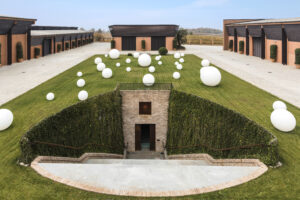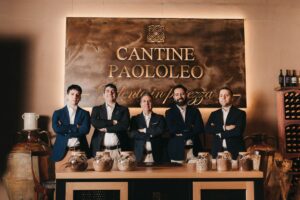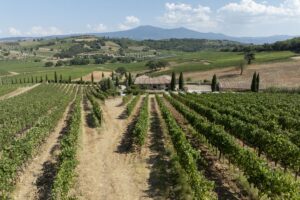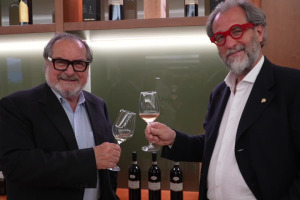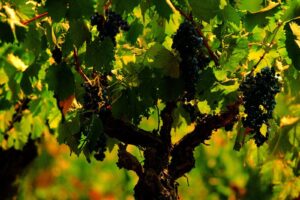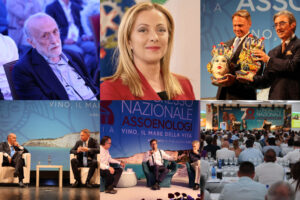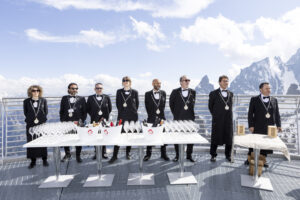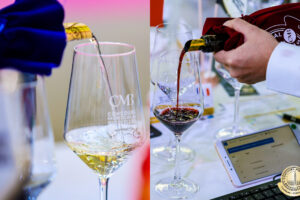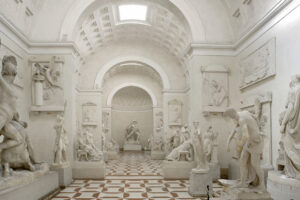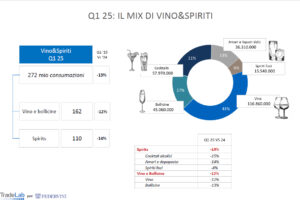Wine was also a top player, like every important Italian production sector, at the General State of the Economy meeting/event that Prime Minister Giuseppe Conte called to bring together government representatives, social partners - trade unions and production associations - and intellectuals to define, and share the lines of economic intervention needed to revitalize the country after the crisis caused by the Covid-19 pandemic. Franco Maria Ricci, president of the Italian Sommelier Foundation was at the discussion table that was held on June 21st, at Villa Pamphili in Rome. Ricci delivered a long speech, narrating the history of wine as well as the economic, social and cultural value of wine, and the aspects of work and training, which we shall share and publish here below.
“Italy is the largest wine country in the world.
Diversity represents its greatest wealth. There are over 435 Italian vines, while in the rest of the world there are only 57. Knowledge of wine has a very special appeal for those who are preparing to attend a school program as well as for those who will be working in the wine sector. In the past 25 years, the interest and desire to better understand the culture of wine has undoubtedly grown. Obviously, better quality of the product has attracted consumers who are more attentive and also better prepared today.
In those years Luigi Veronelli, Mario Soldati, Gianni Brera were the top names who collaborated with the daily newspapers, Corriere della Sera, La Stampa and others to write their Monday articles on football or other sports. Each of the three, however, had the same weekly goal, a visit to a vintner, which allowed them to enrich their piece writing about wine. And that was all there was to wine journalism then. Today, there are continually new stimuli to increase this knowledge. It is easier to talk to producers, and there is a new journalism that narrates wine and criticizes it, so perhaps this is the reason wine producers compete to improve the quality of their products, and often they present excellent news.
It would be ingenuous, though, to just accept the hedonistic concept of either good or mediocre to represent the excellence of Italian wine. Of course, I am here to relate good news to you about how wine has changed from those years to the present day. The high professional and ethical standards with which educational work has been carried out has substantially changed ordinary people, professionals and young people’s sense of wine as a training experience, teaching them how to respect the bottle and the noble work of the women and men in our country and around the world. As a matter of fact, in 2019, 30% more enrolled at the Agricultural University and 27% more at the Faculty of Oenology.
Wine is first and foremost the art and culture of our country, which is why it is imperative it be treated on a par with other cultures. More importantly, medias must not be reluctant to report on the products of the earth, the wines of the territories, and their diversities. Reporting about wine means not being afraid to talk about wine on state television channels, but rather to set up programs that will give Italians the freedom to perceive the passion that only wine can give. At school, the agro-food and wine classes must teach about this great civilization, because this is how young people learning about wine will be attracted to it and the authentic passion of its culture. Then, finally, those famous words, "moderate use", will have no reason to exist - because those who know wine profoundly also know when it is time to stop. Recently, the consumer’s relationship towards Italian wine has changed a lot. For instance, just the fact that over 200.000 people attend our Courses each year, and we are totally convinced that studying changes one’s life for the better, whatever the profession of the participants, is a measure of positive change. It contributes more and more to expanding the domestic market as well as adding to the extraordinary export business, which today makes Italy the number one country in the world. I am also the president of the Sommeliers in the World and in the past few days, I have listened to many presidents in various nations who have all agreed the sentiment in their countries is that there is an enormous desire for Italian wine.
Producers need not fear further drops in sales. I actually see a very promising future. The Made in Italy products that we have narrated so far have nothing to fear. Our sector is, will be and must be a life opportunity - a fantastic job opportunity. And, there are many working areas available to the participants of our Courses. Wineries today are hiring sommeliers and the sales and export agencies are looking for sommeliers as collaborators. Wine journalism is widely represented today; we have counted at least 40.000 journalists. There are many wine teachers and over 10.000 professional sommeliers that serve in restaurants, catering and hospitality. Furthermore, young entrepreneurs, from Piedmont to Sicily, over the last twenty years, have created 18.000 specialized wine shops. Young people that are aware and genuinely interested in the culture, spend their evening hours at these wine shops instead of at a disco. They talk about their passion and the sense of life.
I have repeatedly stressed that wine, the food products of the territories and oil, are our country’s greatest opportunities. They are culture, like architecture, poetry and literature. Appeal, being aware of the extensive culture and a millenary tradition, are what for Catholics represents the sacrifice of Christ and the miracle of Cana. And, for everyone they are an opportunity not to be missed, to be narrated, to be spread around and to be used for a lifetime. They are an extraordinary wealth because of the enormous diversity that identifies each of the products of the Earth: the vines for wine are the immense quantity that I have already mentioned, compared to the rest of the world, together with many cultivars for oil and myriad of food traditions, that no other country in the world has on its territories. This is the reason I wanted to talk only about wine culture, because only culture can perform the miracle of greatly expanding the domestic market. Knowledge of the gift of God can make us better, and when young people grasp the message of the great passion wine knows how to give, they will certainly realize when to quit, understand its use with love, integrity and enthusiasm.
Mr. Prime Minister, talking about Italy, you have referred several times to the enormous quantity and quality of art and cultures that Italy houses, attributing them a high and unique sense of beauty. Restructuring Made in Italy for a secure job, especially through teaching, as an investment for the future of young people, means precisely letting them participate in the extraordinary beauty of our people in their life experiences”.
Copyright © 2000/2025
Contatti: info@winenews.it
Seguici anche su Twitter: @WineNewsIt
Seguici anche su Facebook: @winenewsit
Questo articolo è tratto dall'archivio di WineNews - Tutti i diritti riservati - Copyright © 2000/2025










